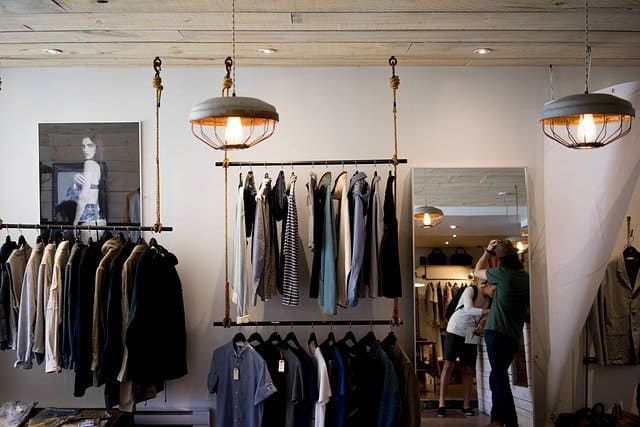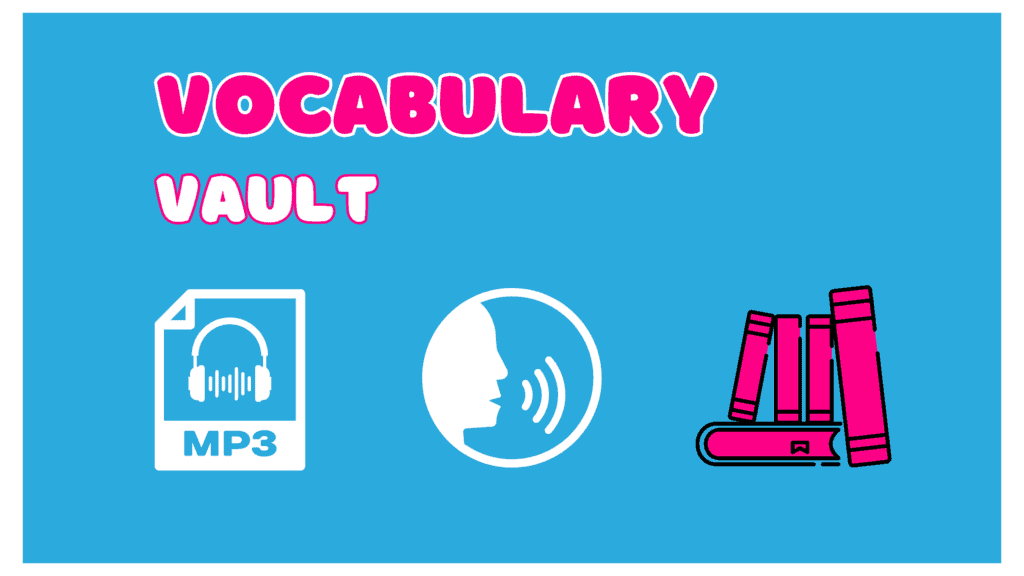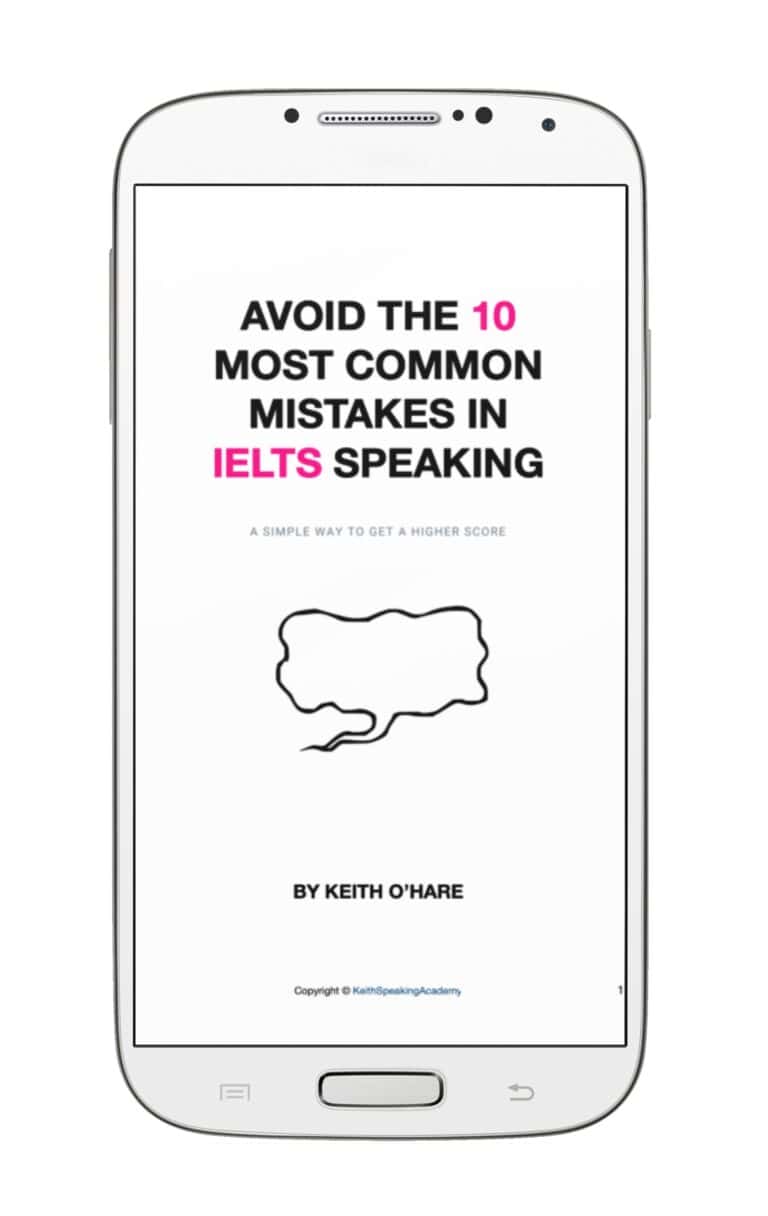IELTS Speaking Lesson about Clothes
👇 Take this lesson with you! 👇
Table of Contents
Introduction
Clothes in IELTS speaking is not easy because there is so much special vocabulary you need to talk about this topic.
In this IELTS Speaking lesson on the topic of clothes, you will learn how to talk about the clothes you wear clothes you like, and clothes for different occassions.
IELTS vocabulary: Clothes
Be careful with these common mistakes!
- The clothe I love is X
- The cloth I like most is…. X
Clothes (is always plural)
Cloth refers to the material and is also used for materials used for cleaning
One item of clothing I love is 😄
One piece of clothing I love is 😄
- I like to dress jeans X
I like to wear jeans 😄
- I wear jeans, it is so comfy X
I wear jeans/trousers, they are so comfy 😄
My jeans / trousers (g.b.) /pants (u.s.) are comfy
Essential verbs
1. To wear clothes – (sounds like “WHERE”!)
- To wear is irregular
I usually wear jeans and a T-shirt
Last week, I wore a suit – WAR!
I have never worn a tie before!
I tend to wear…
2. To dress (usually no object)
I like to dress smartly / casually / neatly
I will dress up when going to a party = dress smartly
To get dressed
I got dressed quickly
I got the children dressed
Phrasal Verbs
- I haven’t worn these new shoes in yet!
=to wear something new until comfortable - I have worn this jacket out, I need a new one
=used so much it can no longer be used - I am worn out
= I am tired!

Different kinds of clothes you like to wear
Be careful with this common mistake when talking about clothes in IELTS Speaking.
- I like to wear short skirt X
I like to wear short skirts 😄
I like to wear a short skirt 😄
I like to wear smart pants
(= clean and tidy)
You should use either the plural or use ‘a’.
I typically wear jeans and a t-shirt / a hoodie / a sweatshirt / silk clothes
I like to look dashing = handsome/beautiful
Describing your favourite clothes
Here are some useful words and collocations you can use to describe your favourite clothes and different type of clothes you may wear.
- simple
- casual
- presentable = quite smart
- scruffy = messy, untidy
- willy-nilly =without care, a bit untidy
- stylish yet comfy
- elegant
- chic
- dressy
- a conservative style
- classic clothes
- vintage clothes
- semi-formal dresses / clothes
Dressed up to the nines = really smart/elegant
Dressed to kill (for a woman)= really smart/elegant
I am going to dress to impress!
- bright/dark colors
- baggy = very loose (too big)
- tight / clingy = (too small)
- fashionable
Clothes that are in fashion
Be careful with this common mistake about using the word ‘colour’ when describing colours – you don’t need it!
I like to wear clothes in black colour X
When talking about colours in English, we rarely use the word ‘colour’. Just use the actual colour!
I like to wear clothes in black 😄
I like to wear black clothes 😄
The clothes I wear! [Video]
Watch the video and decide if the following are True or False – T/F
- After work, I like to slip into a t-shirt
- I love accessories
- In the summer I wear a Panama hat
- At work now, I have a dress code to follow
- In my old job, I would wear slacks or chinos
- I always wear tailor-made shirts
- If I am going out to a restaurant, I usually go for the smart casual look
See answers
- T
- F
- T
- F
- T
- F
- T
Useful clothes vocabulary from the video
- After work, I like to slip into a t-shirt = change into…
- I prefer to wear polo shirts and shorts in the summer
- I am not really one for accessories = jewellery, belts, bags, gloves, hats….
- I don’t really wear chains and stuff
- I do wear a cap in the autumn to keep my head warm
- In the summer I wear a Panama hat because it keeps the sun out of my eyes
- At work, we have a dress code to follow
- We have to wear business casual
- In my old job, I would typically wear a jacket
- I would have to wear a shirt and tie with a jacket
- I would wear slacks or chinos = smart trousers
- I usually put on a jersey, a jumper, or a pullover (all the same)
- I usually wear off the peg shirts, not tailor-made ones
- I like short-sleeved shirts rather than long-sleeved ones
- Snug as a rug = fits perfectly
- Fits like a glove = fits perfectly
- There wasn’t a strict dress code
- Many women wore business casual
- The women would typically wear a knee-length skirt or slacks, a blouse, and maybe flat shoes, rather than high heel shoes
- If we are going out, I would probably go for the smart casual look
- I may wear jeans, it depends on the mood, on the vibe
IELTS Speaking tip - use spoken English
Tip: In a speech, we often repeat things, but with a slight difference.
SPOKEN
WRITTEN
…and it drives me around the bend, and not only that, not only does it drive me round the bend, it really scares me.
…and it drives me around the bend, and not only that, it really scares me too.
If you write your answers out in perfect sentences, it will not sound natural, it will sound like you are a book!
Don’t write your answer out first,
Speak your answer first, then record it, then write it out.
Students' questions about clothes
- Keith, are clothes important to you?
- It’s a good question. I mean on a basic level, yes, of course clothes are important.
- I need practical clothes, for example, if I am going out walking and it’s raining, I need to wear the appropriate kind of clothes.
- Maybe a rain coat, taking an umbrella, something that will protect me from the rain.
- So, from a practical point of view, I think clothes are really important.
- From a fashion point of view, I don’t think they are that important.
- I know some people say that clothes represent your identity and its a way of expressing your personality,
- but to be honest, for me, I take a much more pragmatic (=realistic) approach.
- I think clothes are just a way to cover ourselves and keep ourselves warm or keep ourselves cool.
- I don’t really see them as fashion accessories or a way of expressing who I am, but that’s just my personal take (=personal opinion) on clothes.
Keith, how do you think fashion trends have changed since you were younger?
- I think fashion trends have changed enormously in the past 30, 40, 50 years, not just from the 90’s, but even before that.
- You know, I remember when I was young, back in the day, flared jeans, (=bell-bottom jeans) flares, were very popular, and shirts with really long collars,
- these huge, flying collars, they were fashionable, as was long hair as well, especially for men,
- but I think whilst jeans are still popular, flared jeans went in and out of fashion, and came back again, but now different kinds of jeans are fashionable, right?
- Ripped jeans are much more fashionable, and shirts with slim-fit, small collars are also popular now, whereas, in the past, they weren’t that popular.
- The old-fashioned kind of mini-skirts went out of fashion and then again came in fashion.
- So, it strikes me (=it seems to me / I think) actually, that fashion goes around its cycles and it’s not long before it comes back into fashion.
- So, fashion has changed, but I’d say not in a linear way, but in a circular way if I can say that.
Final notes:
You don’t have to do a conclusion at the end of IELTS Speaking Part 2 or Part 3 questions. If you can, that’s great, but it is not necessary.
Your dress will have little influence on the examiner, you can wear casual clothes, but I recommend you are tidy and presentable.
Pronunciation Files For Vocabulary From My Best Live Lessons
Use Words EASILY in English Conversations!
More Free IELTS Speaking Lessons
If you liked this lesson, leave a comment below!
There are more lessons you can follow in the links below too.
CHANGE in IELTS Speaking. Learn to talk about personal, professional and global change, and get some tips for IELTS Speaking Part 3.
SHOPPING in IELTS Speaking. Learn the essential vocabulary for this topic, as well as how to talk about online shopping
MONEY in IELTS Speaking. Learn how to talk about earning, saving and spending money.



Hi Keith, I have watched your youtube lessons were amazing and helpful. I have taken the IELTS test multiple times. I have noticed using a variety of grammar and expressions are important. Despite that, the role of the teacher is equally important. From my experience, I have never got a score below 7.5 in speaking in the last two years. However, I got only 6 on the last IELTS test. The teacher, who examined me, was new, and her assessment was quite different from that of previous teachers. This contradiction in my scores affected my confidence very badly. Finally, I understood how much is important for teachers to be professional and knowledgeable about the rules and structure of the IELTS test.
Don’t be too disappointed, I am sure you can do well in your next test. Stay positive and keep focused on your study and practice.
Hi
Hi sir can u take my exam.
Thanks for getting in touch Ritu.
I am afraid I am not taking on any new students for mock tests any more, due to a heavy workload
Thanks a million Keith, I only had 1 month to study for Ielts and I can say I learned the most from ur website and videos. The interesting was that after watching your topnotch clips on YouTube, I realized learning through videos suits my learning style better than anything else. I will continue watching ur clips even after my exam. However I could not attend ur classes but I learned so many great tips, structures and exressions.Last but not least,I have recommended ur page and website to all my friends preparing for Ielts since I think it is second to none .
All the Best
Thanks for the comments Linda and for sharing this website with your friends. I am so pleased I could help with your preparation for IELTS. Best wishes, Keith
Hi sir, Keigh I’m from Uzbekistan my name is Muhammad and I’m 21 years old I have been learning English for 1 year. I wanna take an IELTS exam so if you have time If i give the money Could you take Mock exam to me. sorry to disturb and thanks for your answers.
Hi Muhammad, thanks for getting in touch.
I am afraid I am not taking on any new students for mock tests at the moment, due to a heavy workload
Best wishes, Keith